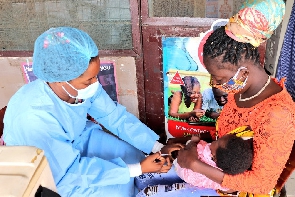 A health practitioner immunising a child
A health practitioner immunising a child
Inadequate and late releases of funds impede the implementation of routine immunization. Untimely releases of funds make it difficult to embark on outreach services to meet timelines and targets given that immunization services are timebound.
This affects regular monitoring & supportive supervision due to inadequate fuel, maintenance of motorbikes and cold chain and unavailability of adequate vaccine storage refrigerators.
Consequently, some children who need immunization may not be reached with all the required vaccine thus affecting the health of children in the future.
To find answers to some of these challenges listed above, SEND GHANA in partnership with Hope for Future Generations and Socioserve-Ghana undertook a monitoring of immunization budget execution in selected districts for the period 2018 to 2021.
The districts were Shai Osudoku, Asuogyman, Ho, Tatale/Sanguli and Kasena Nankana Municipal and District Assemblies in four regions comprising the Northern, Eastern, Volta and Greater Accra. These districts were purposively selected to build upon previous work on immunization by SEND GHANA and HFFG (the immunization advocacy initiative, 2019-2021).
Funding and technical support for this exercise came from the International Budget Partnership (IBP) and UNICEF. The monitoring and analysis of findings were done from April 22 to January 23.
The objectives(s) of the monitoring were to:
• Explore budgetary allocations, disbursements, and utilization for immunization related activities at the selected districts for the period 2018 to 2021 and
• Examine the effects of budget credibility issues on immunization services.
Findings of the Monitoring Visits
1. District Health Management Teams - DHMTs and Metropolitan and Municipal District Assemblies (MMDAs) underscored the importance of immunization in the districts. Therefore, the DHMTs and the MMDAs implement the plans and carry out assessments annually to measure the performance of the districts on some health indicators including immunization. Additionally, the DHMTs presents on quarterly basis, reports to the MMDAs to enable them to track the performance of the districts with regards to immunization and other health interventions.
2. At the local government level, the MMDAs and DHMTs mentioned that immunization is financed from several sources including Internally Generated Funds (IGF), Development Partners (DPs), the District Assemblies Common Fund (DACF) and the Covid-19 levy. However, the DHMTs rely heavily on DPs to finance most of the immunization related services.
3. The five district assemblies stated that they are unable to adequately finance immunization due to financial constraints and other competing priorities. The MMDAs noted that much of the expenditure on health, is spent on infrastructure development such as building and making functional Community-Based Health Planning and Services (CHPS) compounds.
4. At the national level, the budget support procurement of vaccines and immunization related logistics such as cold chain storage, backpacks, needles, syringes, salaries, and the capacity building of healthcare workers. The district assemblies’ funds is invested in immunization outreach programs especially during mass inoculation through the provision of fuel for transportation, logistical support such as renting canopies, chairs, feeding for staff and monitoring and supervision.
5. Budget performance over the years have been of concern due to weak execution rate. Analysis of the 2020 and 2021 annual budget performance indicates an execution gap of 7.6% and 6.9% respectively of the health budget. From information provided by the districts on immunization budgets, four districts did not allocate funds for immunization related activities though it was budgeted for.
6. According to the districts, disbursement of funds for immunization activities is never timely. This is largely attributed to the delay in the release of funds from the national level to the district, thus, affecting the level of support the district assemblies provide to the DHMTs.
7. The districts rated their satisfaction with the district’s immunization budget in terms of adequacy of allocations, timeliness of disbursement, and utilization. On the scale of 1 to 3 with 1 as not satisfied; 2 somewhat satisfied and 3 satisfied. All districts were not satisfied with adequacy of allocations and receipts for immunization. Despite the dissatisfaction with allocations and disbursement, all the districts were content with the rate of utilization of funds that is released for immunization.
Recommendations
• Improved collaboration between DA and DHMT. The District Assembly and the DHMT should plan, document, and properly allocate IGF, DAGF and funds from donors. This will instill trust, and open avenues for regularized funding, In the same vein, there needs to be more resources allocated to certain immunization related activities. This includes capacity building training, conferences, logistics and stationery.
• The district response initiative for malaria at the district level could be expanded to include immunization activities. Similarly, the District Assembly should be encouraged to align immunization activities to CHPS strengthening.

• The decentralization of Health would get the Assembly to pay more attention to health like they do to education and Agric which is decentralized.
• Advocacy by CSOs and other key stakeholders on the inclusion of immunization financing to core districts indicators from the National Development Planning Commission.
• For MMDAs to be committed to and intentional about efficient immunization service delivery, it is recommended that MMDAs should incorporate immunization financing into their districts plans and budgets. The first step is therefore to include immunization financing as part of the Medium-Term Development Plan (MTDP) of district assemblies. It is refreshing to note that the current MTDP (2022-2025) captures immunization. Guideline for preparing district plans and/or budget should therefore come with a specific line on funding for immunization.